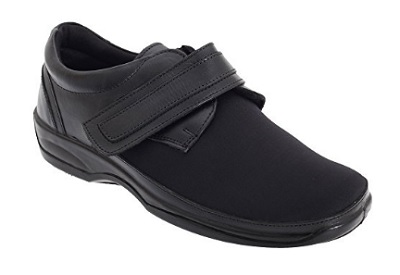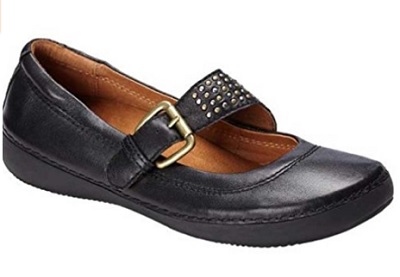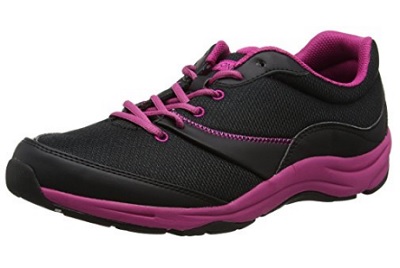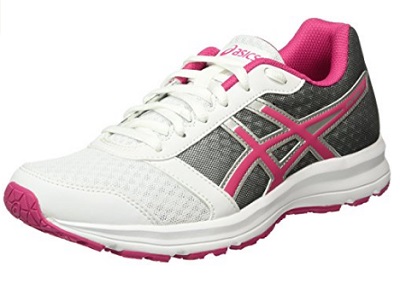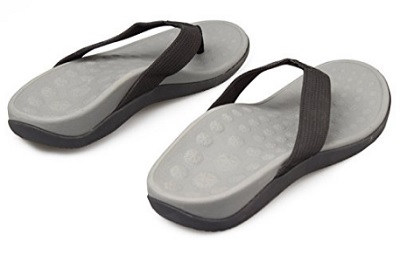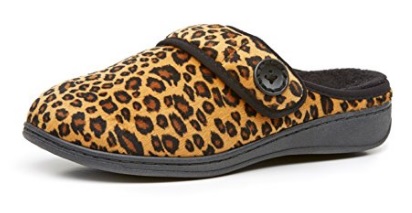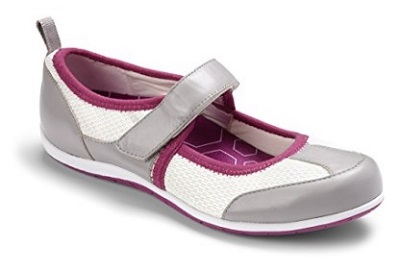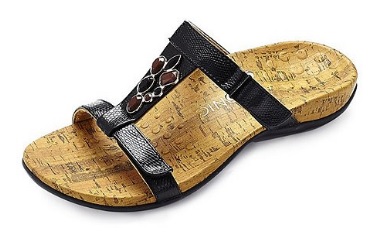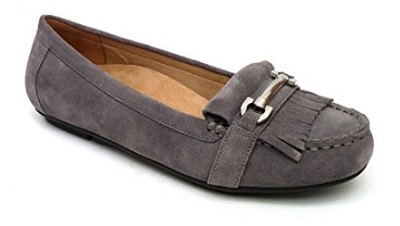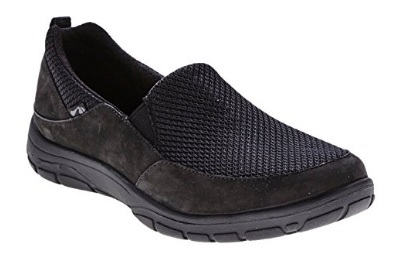Have you ever woken up in the morning, taken the first few steps and immediately doubled over as pain pierced through your heel? Does that pain also occur after an intensive workout session, after a long walk or after standing for too long?
If you have been experiencing this kind of pain, you may be suffering from plantar fasciitis.
At the very bottom of your foot, there is a thick band of tissue (called a ligament) that stretches from the heel to the toes. This ligament is known as plantar fascia.
When you are walking, running or standing, plantar fascia acts as a shock absorber. It protects the arch of your foot from damaging pressure and shock.
Sometimes small tears can develop in the fascia. This causes the onset of pain usually centered in your heel area. Researchers speculate that these bruises come about as a result of repeated stretching of the ligament during motion. But the full causes are still under research.
Sports injuries, too much stress to the feet (for those who walk or stand a lot) and aging are contributing factors to plantar fasciitis. In most people, the pain starts out mildly and gets worse with time especially if no action is taken. Certain activities such as running can aggravate the pain.
Table of Contents
- So, which are the best shoes for plantar fasciitis?
- 1. Mod Comfys Womens/Ladies X Wide Comfort Shoes
- 2. Vionic Orthotic Goleta Mary Jane Shoe
- 3. Vionic Women’s Kona Orthotic Trainers
- 4. Asics Women’s Patriot 8 Running Shoes
- 5. Pro 11 Wellbeing Orthotic Sandals
- 6. Vionic Laura Slipper
- 7. Vionic Ailie Active Shoe
- 8. Vionic Viviana Sandal
- 9. Vionic Thina Loafer
- 10. Strive Florida Womens Orthotic Footbed Trainers
- Key considerations when buying shoes for Plantar Fasciitis
- Frequently asked questions
So, which are the best shoes for plantar fasciitis?
Wearing the right kind of shoes can go a long way in mitigating the pain and preventing it from getting worse. The shoes should offer proper support, be comfortable and maintain natural foot alignment when standing and during movement.
The aim is to reduce the stretching of the plantar fascia ligament while also providing adequate support and shock absorption to the arch. Here are our top footwear recommended picks for people with plantar fasciitis in the UK.
1. Mod Comfys Womens/Ladies X Wide Comfort Shoes
These unisex shoes are made for ultimate comfort and support. They have a wide fitting, which accommodates natural foot alignment. The inner lining is super soft to provide proper cushioning to the feet when you are walking or standing up. This takes the pressure off your fascia ligament thus reducing pain and discomfort.
A leather upper provides durability especially for those with an active lifestyle.
Pros
- Ultra soft, making them ideal for those who spend a lot of time on their feet.
- Extra wide. This provides a perfect fit especially for older users and those with arthritic feet.
Cons
- Not ideal for those with narrow feet.
2. Vionic Orthotic Goleta Mary Jane Shoe
This Mary Jane-style shoes come with a simple but effective design. The buckle closure makes it easy to secure them on your feet. Stand on your feet and you will immediately feel the soft lining.
You can walk or stand for hours without experiencing the usual discomfort. These are one of the best walking shoes for plantar fasciitis.
The sole is designed in such a way that it provides gentle support to the arch and relieves the fascia from constant stretching.
Pros
- Soft lining.
- Excellent support.
- Easy-to-use buckle closure.
Cons
- Not ideal for those who prefer closed shoes.
3. Vionic Women’s Kona Orthotic Trainers
If you are looking for a way to minimize heel pain when working out, these Vionic trainers can help. While it looks like any other sports footwear, it provides more support for your feet than ordinary running shoes.
The cushioned sole is flexible, allowing your feet to move naturally and providing supportive comfort as you hit the road (or play a tennis match). A mesh upper keeps your feet cool and dry while a rubber outsole gives the shoes longevity.
Pros
- Excellent support.
- Ultra comfortable.
- Cool design.
Cons
- Ideal for sports and casual wear but not formal use (except for a few cases such as nurses).
4. Asics Women’s Patriot 8 Running Shoes
Perfect for the gym or meet up with friends, this pair of orthotic trainers provides the best in comfort and support. The soft inner-sole provides the right amount of arch support while cushioning your heel from too much pressure. A mesh upper keeps the interior breathable, ensuring your feet are not baked in sweat and heat.
Whichever type of surface you are running on and whatever the weather, these shoes will be up to the task.
Pros
- Durable gum rubber sole.
- Soft and comfortable inner sole.
- Supportive mid-sole.
Cons
- They are a bit narrow especially across the top. Not ideal for those with wide feet.
5. Pro 11 Wellbeing Orthotic Sandals
Simply because you are spending the day at home doesn’t mean you don’t need to take care of your feet. Wearing the wrong slippers or sandals can make your plantar fasciitis worse.
These orthotic sandals are designed for use at home, at the beach or for short walks around the neighbourhood. The design features a raised midsole for full arch support. A deep heel cup keeps your heels well aligned and fully cushioned.
Pros
- Super comfortable. Some users compare wearing them to walking on air.
- Provides support for those with plantar fasciitis and overpronation.
- Ideal for indoor and outdoor use.
Cons
- Not ideal for those with narrow feet.
6. Vionic Laura Slipper
These easy slip-on slippers are designed to correct overpronation. They also come with a deep cushioned heel cup that is highly beneficial for those with plantar fasciitis. The fabric midsole together with the faux fur upper gives the shoe a cozy and warm feel. A sturdy rubber sole provides adequate traction no matter what surface you are walking on.
Pros
- Comfortable to wear.
- Easy slip-on design.
- Good arch support which reduces overpronation and heel pain.
Cons
- Not ideal for those with narrow feet.
7. Vionic Ailie Active Shoe
The Ailie active shoe is equipped with FMT technology to maximize comfort and support for wearers with various foot problems including plantar fasciitis.
FMT comprises a deep heel cup for stability and heel cushioning, a biomechanical support for support and a flexible midsole for natural foot movement.
The sole is gum rubber which provides traction and durability. A mesh upper keeps air flowing in and out, thus keeping your feet cool and dry.
Pros
- Excellent support and comfort.
- Easy-to-use closure method.
- Reduces overpronation and heel pain.
Cons
- These are not all-weather shoes.
8. Vionic Viviana Sandal
Most people don’t put much thought into the kind of sandals they wear. For those with plantar fasciitis, even an hour or two of wearing non-supportive sandals can aggravate the condition. The Vionic Viviana sandal is designed with inbuilt arch and heel support.
This ensures that your fascia is not subjected to too much stretching and that your feet move naturally. You can use these sandals indoors at home and as outdoor casual wear.
Pros
- Good heel and arch support.
- Very comfortable.
- Easy-to-use buckle closure.
Cons
- These sandals have a wide fit so they are not ideal for those with narrow feet.
9. Vionic Thina Loafer
If you have been looking for a nice comfortable pair of shoes for both formal and casual wear, the Vionic Thina loafers are a great option. They come with Vionic’s FMT technology which includes a stabilising heel cup, a biomechanical foot bed and flexible midsole. This design comes in handy if you spend a lot of time standing or walking up and down.
The outer material is leather, ensuring the loafers lasts for years. The gum rubber sole provides good traction.
Pros
- Easy slip-on design.
- Durable leather outer and gum rubber sole.
- Excellent support for the arch and heel.
Cons
- They are a medium to wide fit, making them a bit too big for wearers with narrow feet.
10. Strive Florida Womens Orthotic Footbed Trainers
These podiatrist-designed trainers feature a biomechanical foot bed that supports natural foot movement while also providing adequate shock absorption. A mesh upper ensures breathability even when it is sweltering hot.
A leather outer and gum rubber sole keep the trainers sound and strong over the years.
Pros
- Excellent at comfort and support.
- Ideal for casual and formal wear.
- Durable.
Cons
- Not ideal for those who prefer fully closed shoes.
Key considerations when buying shoes for Plantar Fasciitis
Here are a few things to keep in mind when you are shopping for shoes to relieve your plantar fasciitis.
i) Getting the size right
Plan your shopping in the afternoon or after walking for a while. Feet tend to expand through the day. You may buy a seemingly good fit only for it to pinch you after wearing it for a few hours.
If you are shopping online, measure your feet later in the day rather than in the morning. This ensures that whichever shoe you order will fit you perfectly all the time.
ii) Formal, casual or both?
Which kind of shoes are you looking for? If you want a pair you can wear to the office look for formal shoes with a simple, sturdy design. Most formal shoes can also be worn for casual occasions. If you want something super casual or for use at home, find some well designed sandals or slippers.
Our top 10 recommendations above include different styles and options. Look through them until you find the style that fits your needs.
iii) Sports shoes?
If you have a hard time working out because of pain in your heels, what you need is a good pair of running shoes. Asics Women’s Patriot 8 Running Shoes and Vionic Women’s Kona Orthotic Trainers are great options.
Whether you are playing a sport, going on a run or working out in the gym, orthotic sports shoes ensure that your feet are always supported and protected from excess impact.
iv) Comfort above all else
The single important feature of shoes for plantar fasciitis is comfort. They should be comfortable right from the start without requiring you to go through a break-in period. If the size is not right – maybe they are too narrow or the toe box is tight – consider returning them for another bigger or smaller size.
An uncomfortable pair of shoes can make your heel pain worsen to the point where even walking is a problem.
Make sure you can wear the shoes for hours without feeling uncomfortable. If they are sports shoes, you should be able to complete your workout without experience as much pain as before.
v) Good support
Comfort and support go hand in hand. Shoes cannot be comfortable without adequate support. For plantar fasciitis shoes, most of the support is concentrated on the arch. The aim is to prevent the overstretching of the fascia ligament and also reduce overpronation, something that can also cause plantar fasciitis.
Note that sports shoes come with extra cushioning for added support and shock protection. This is necessary for high-impact activities such as running.
vi) Durability
A good pair of shoes for plantar fasciitis is not cheap. It would be even more expensive if you have to keep buying a new pair now and then. That is why you should look for durable shoes that can easily last years.
The most long lasting foot wear often consists of leather as the outer material and gum rubber as the sole.
An important point to note: make sure you replace your shoes every few years. As shoes get older, they provide less support and comfort even if they look good from the outside. You may even notice some of the earlier pain starting to come back.
So even with durable shoes, it is not a good idea to wear them for too long. Look out for signs like a worn out sole, thinner cushioning and the onset of soreness.
Frequently asked questions
Q: Will shoes for plantar fasciitis completely cure my condition?
A: No, but they can mitigate it. Wearing the right shoes mostly helps in preventing the condition from getting worse. It also reduces the pain, allowing you to walk or workout comfortably. Your podiatrist can help you with additional measures to treat plantar fasciitis.
Q: Why can’t I wear normal shoes?
A: Because they are not designed to deal with plantar fasciitis and many other foot problems. They lack the kind of support and cushioning that orthotic insoles or footwear provides. If you opt to go with normal shoes, your condition will grow worse and you will experience more pain.
Q: What else can I do to improve my condition?
A: Your podiatrist can advise you on any additional actions you can take. For instance, there are certain exercises that can help strengthen your feet and boost natural support. In other cases, a doctor may recommend weight loss to take off excess pressure from your feet.
Q: Which shoes work best for plantar fasciitis?
Look for shoes with good arch support to prevent the fascia ligament from overstretching, which will worsen the pain.
In addition, shoes for plantar fasciitis should have a cushioned innersole to absorb shock and a comfortable fit that doesn’t put pressure on any part of your feet.
Q: Can shoes cause plantar fasciitis?
Yes, they can. In fact, wearing the wrong shoes is one of the most common causes of plantar fasciitis. Old and worn out shoes are the worst. They cause feet imbalance when walking or running, putting too much pressure on specific parts of your feet and causing painful tears in the fascia ligament.
High heels and ill-fitting shoes can also cause plantar fasciitis especially for people with an existing foot condition such as flat feet.
Q: Does walking barefoot help with plantar fasciitis?
Most podiatrists don’t recommend walking around or running barefoot if you have plantar fasciitis. A supportive pair of shoes/sandals and plenty of rest is the best way to deal with the pain.
Once you are better, consider doing some barefoot exercises like dancing, pilates and yoga to strengthen your foot core and reduce the risk of future injury.

